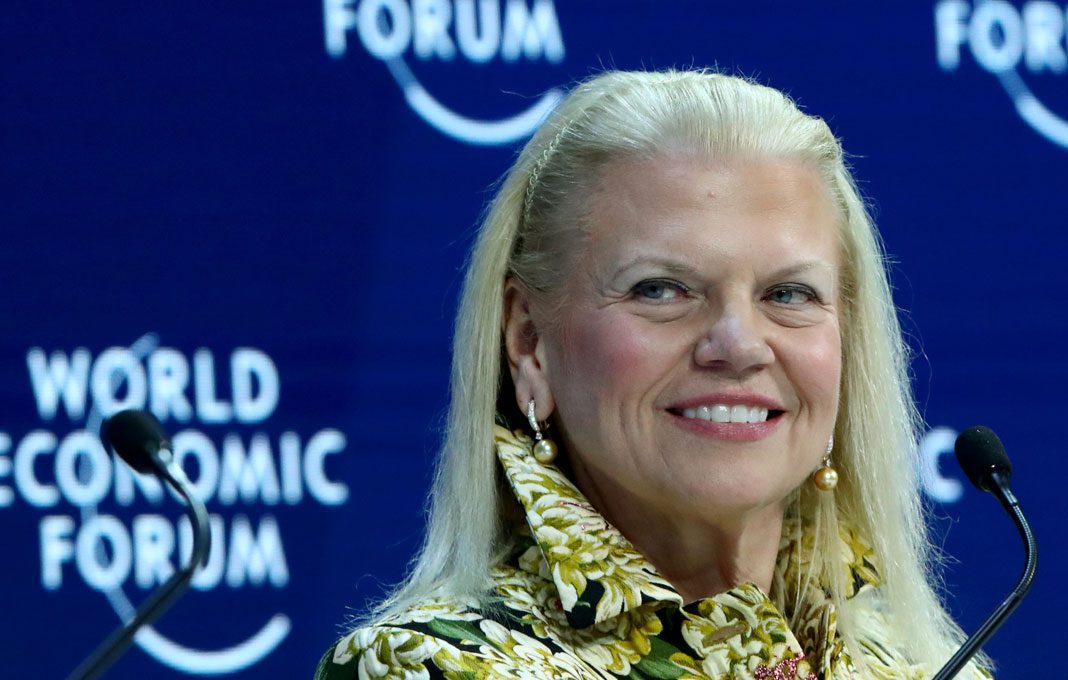
Moses may have been able to see the Promised Land, but that doesn’t mean he could complete his mission to lead the people there. A different skill set was needed, and Joshua was selected. No one faults Moses for his time in the desert.
History will be equally kind to Ginni Rometty, the CEO of IBM. The company’s share price may have lagged rivals over the last few years, but inside the company—deep inside, where it counts—Rometty has transformed IBM in every possible way, setting the stage for a promising next chapter. IBM’s stock is up 25% just this past year.
Last week, she and her board announced that a highly technical expert—the company’s widely-respected cloud business chief Arvind Krishna—would succeed her. He’s an ideal choice for this next phase in IBM’s journey. Krishna, a 30-year IBM veteran, has been serving as SVP of Cloud and Cognitive Software, where his IBM duties embraced hybrid cloud, AI, security and cognitive computing, while leading efforts to reengineer IBM’s software and services portfolio for new cloud offerings. He led the 2019 acquisition of Red Hat.
In addition, Krishna leads IBM Research, one of the largest private research institutions in the world, with over 3,000 scientists and technologists located in 12 labs across six continents. A computer scientist himself, he has 15 patents and has served as editor of top computer-science journals. Given his background, Krishna surprised some with his business acumen and humble leadership style. When he served as general manager of IBM Information Management, he helped grow the business by 50 percent. I have seen him in action at our Yale CEO Leadership Summits—when he speaks, the room goes silent in rapt attention.
Meanwhile, Jim Whitehurst, Red Hat’s enormously talented CEO will step up into IBM’s presidency—a strong endorsement of the company’s purchase of Red Hat last year. I have worked with Red Hat’s leadership since their founding and I’ve seen Whitehurst’s profound impact as he stepped in after serving as Delta’s chief operating officer, responsible for fixing the airline’s operational challenges. Whitehurst is a great choice.
This excellent team of Krishna and Whitehurst is hardly an accident. It is the result of a year-long transition planning process by Rometty and IBM’s board, another reason why, as Rometty prepares to exit the stage at the end of this year, she should exit with pride of accomplishment on many fronts.
Some cynical business media never quite got the story right, and it was eye opening that the same respected business voices who preach against short-termism were focused solely on the 4 percent jump IBM’s stock took on the news of Rometty’s retirement, rather than the foundation she’d laid for the years to come. So much for long-term investment, technological transformation, community impact and “ESG,” right?
What these commentators failed to trumpet was Rometty’s success in transforming the technological offerings of IBM while catalyzing culture change and investing more than $120 billion in the business since 2012, with 70 percent of those investments in cloud and cognitive technologies. IBM’s cloud business is now at $20 billion, some 25 percent of IBM’s total revenue. Only Amazon and Microsoft have larger cloud businesses.
At the same time, she shed $10 billion of annual revenue over the last 5 years to invest in newer, higher-return platforms. These investment shifts built a business portfolio that is now more than 90 percent software and services. When she stepped in as CEO, the commodity legacy hardware business represented 50 percent of IBM’s offerings. Now it’s just 10 percent.
Much of what IBM had in services was already Rometty’s creation from internal business building she led in earlier roles, including her successful acquisition of PwC’s consulting business. And IBM’s hardware business is hardly stagnant, having produced the world’s two fastest supercomputers—the Sierra and the Summit.
IBM Blockchain, another business born under Rometty’s leadership, has more than 500 massive enterprise projects in progress, with clients including Walmart, top banks and five of the world’s six largest shipping companies. Cloud-accessible computing systems are being developed for Daimler, ExxonMobil, JP Morgan, Goldman Sachs, joining an ecosphere of 180,000 such corporate users.
And two years ago, Rometty became the first CEO to advocate for “Responsible AI,” calling for ethical practices of data stewardship, practices ignored by some of her fellow big tech companies (with soaring stock prices). With her clarion call for integrity, Rometty has laid out Trust Transparency Principles for others to join (https://www.ibm.com/blogs/policy/trust-principles/).
Most important—and most overlooked—is the talent transformation at IBM under Rometty, which will strengthen the company for years to come. In the bro-culture world of Blockchain, IBM is one of the few where the top leadership positions are held by women engineers and scientists. More than half of current IBMers arrived at the company during Rometty’s tenure, and the company has invested nearly a half-billion dollars a year in training and development to attract and keep the best talent worldwide, with the average IBM employee receiving 50 hours of training each year.
Outside of IBM, Rometty pioneered major new education models preparing students for “New Collar” work in programs such as P-TECH schools, which provide inner-city students skills that earn them both a high-school diploma and an associate’s degree at the same time. More than 150,000 students around the world are in the P-TECH pipeline, students from Baltimore, Brooklyn and Chicago to a dozen other countries. Graduates of the program are already at work inside IBM and other companies. It’s been an extraordinary success.
So how could all these accomplishments over an eight-year term have been missed by the media? It may have something to do with the fact that only 60 women have led Fortune 500 firms over the past 50 years, compared with perhaps 6,000 men in these same roles. Research from both Harvard and Wharton shows women are 50 percent more likely to be targeted by activists—findings that go a long way to explain the downbeat analysis of Rometty’s tenure. It can’t be the numbers alone—consider the share rapture that accompanies Elon Musk at Tesla, who is only now only hitting financial targets after years of blown deadlines. It seems likely that we still use different standards for assessing women leaders than their male counterparts.
How soon so many market commentators forget that during the transformations of many of American’s best-led companies—Disney, Walmart, Verizon, PepsiCo, and Microsoft among them—their shares exhibited similar patterns to IBM’s under Rometty. As with Microsoft and Disney, we are likely to see Krishna build on her investments, with investors only catching up later (it’s happening already).
Is it too much to ask business-media commentators to use the performance standards themselves which they scold investors to use? When it comes to IBM under Rometty, a different standard seems to be in place.
That’s a pity. Fifty years ago, IBMers used to joke their company’s abbreviation stood for “I’ve Been Moved.” Now the whole enterprise is moving—and in the right directions. Ginni Rometty made that happen.

Chief Executive Group exists to improve the performance of U.S. CEOs, senior executives and public-company directors, helping you grow your companies, build your communities and strengthen society. Learn more at chiefexecutivegroup.com.
0

1:00 - 5:00 pm
Over 70% of Executives Surveyed Agree: Many Strategic Planning Efforts Lack Systematic Approach Tips for Enhancing Your Strategic Planning Process
Executives expressed frustration with their current strategic planning process. Issues include:
Steve Rutan and Denise Harrison have put together an afternoon workshop that will provide the tools you need to address these concerns. They have worked with hundreds of executives to develop a systematic approach that will enable your team to make better decisions during strategic planning. Steve and Denise will walk you through exercises for prioritizing your lists and steps that will reset and reinvigorate your process. This will be a hands-on workshop that will enable you to think about your business as you use the tools that are being presented. If you are ready for a Strategic Planning tune-up, select this workshop in your registration form. The additional fee of $695 will be added to your total.

2:00 - 5:00 pm
Female leaders face the same issues all leaders do, but they often face additional challenges too. In this peer session, we will facilitate a discussion of best practices and how to overcome common barriers to help women leaders be more effective within and outside their organizations.
Limited space available.

10:30 - 5:00 pm
General’s Retreat at Hermitage Golf Course
Sponsored by UBS
General’s Retreat, built in 1986 with architect Gary Roger Baird, has been voted the “Best Golf Course in Nashville” and is a “must play” when visiting the Nashville, Tennessee area. With the beautiful setting along the Cumberland River, golfers of all capabilities will thoroughly enjoy the golf, scenery and hospitality.
The golf outing fee includes transportation to and from the hotel, greens/cart fees, use of practice facilities, and boxed lunch. The bus will leave the hotel at 10:30 am for a noon shotgun start and return to the hotel after the cocktail reception following the completion of the round.